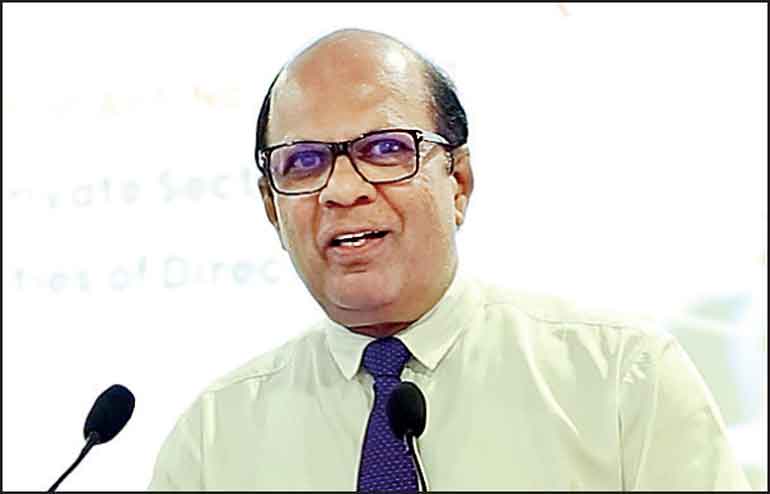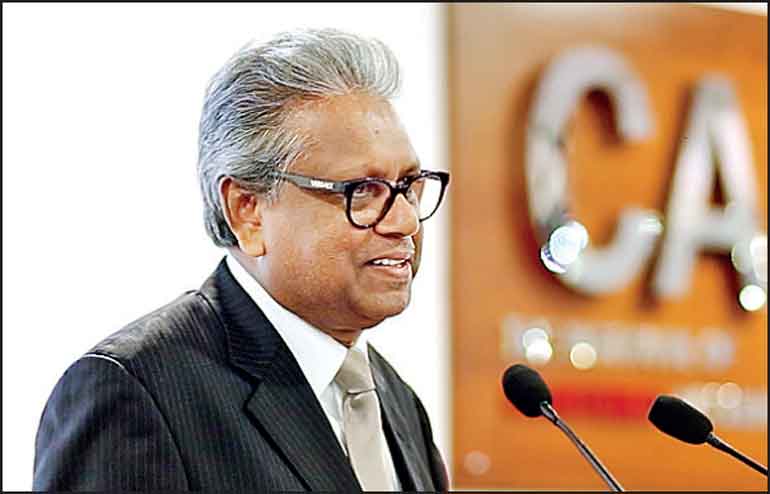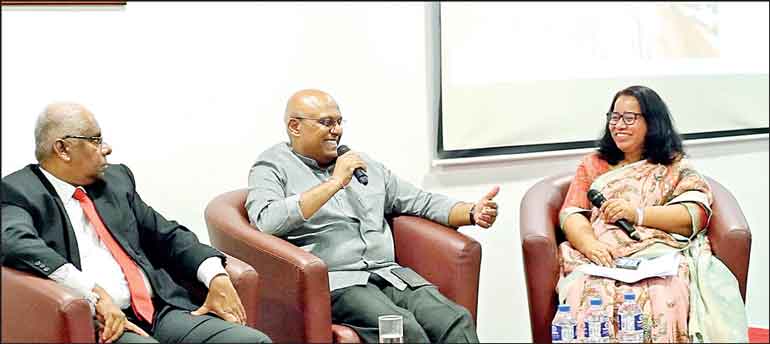Saturday Feb 28, 2026
Saturday Feb 28, 2026
Monday, 30 September 2024 00:14 - - {{hitsCtrl.values.hits}}

Arjuna Herath

President's Counsel Dr. Harsha Cabral

From left: CIABOC Commissioner Chethiya Goonesekera, The Ceylon Chamber of Commerce former Chairman Suresh Shah, and CA Council Member and Ernst & Young Partner Anoji De Silva
A recent session organised by the Policy Advocacy and Economic Contribution Committee (PAEC Committee) of the Institute of Chartered Accountants of Sri Lanka (CA Sri Lanka) focused on how the private sector can act as a catalyst in fighting corruption, with a specific emphasis on the responsibilities of directors.
The Commission to Investigate Allegations of Bribery or Corruption (CIABOC) is essential for promoting accountability and combating corruption in Sri Lanka. The recently enacted Anti-Corruption Act, No. 9 of 2023, plays a pivotal role in reinforcing integrity and ethical conduct within public service.
The CA session aimed to raise awareness about anti-corruption initiatives, engage the private sector, and explore actionable measures beyond legislation.
The resource persons at this session were: Dr. Harsha Cabral, President’s Counsel, who highlighted the legal implications for directors; CIABOC Commissioner Chethiya Goonesekera, who discussed the responsibilities outlined in the new Act; 5-Hour International Corporation Head of APAC and Chief Operating Officer Kasturi Chellaraja Wilson who addressed the corporate sector›s challenges related to corruption; Ceylon Chamber of Commerce former Chairman Suresh Shah, who proposed reforms for a fair business environment; and CA Council Member and Ernst and Young Partner Anoji De Silva, who emphasised the importance of compliance and transparency. The PAEC Committee of CA Sri Lanka plans follow-up discussions and aims to develop a policy document with recommendations for the incoming President of Sri Lanka, focusing on public financial management, tax reforms, and on Anti-Corruption.
Making Directors accountable
Dr. Harsha Cabral opened the session by discussing the complexities directors face, particularly regarding conflicts of interest. The Companies Act requires all directors—executive, non-executive, alternate, or independent—to manage conflicts effectively. Unlike shareholders, directors have access to comprehensive internal information, which places significant responsibility on them to uphold ethical standards.
The Anti-Corruption Act significantly expands the regulatory framework for the private sector. Key provisions include:
Section 106.1: Criminalizes offering or giving gratification to a director or employee to breach their duties.
Section 106.2: Criminalises soliciting or accepting advantages to act contrary to their duties.
Section 116: Imposes penalties on directors, officers, and agents found guilty under the Act.
Section 162: Broadens the definition of “private sector entity,” impacting a wide range of businesses, including those with substantial state ownership.
Directors are now required to implement anti-corruption policies and gift policies, emphasising transparency and compliance. The Act empowers the Anti-Corruption Commission to investigate, arrest, and seize assets, making adherence to these regulations crucial.
Compliance is key
Chethiya Goonesekera elaborated on the Act’s extension of responsibilities for directors and employees. Key points include:
Accountability of Former Employees: Directors remain liable for actions taken during their tenure, even after leaving the company.
Contempt of the Commission: Non-compliance with directives can result in severe penalties, emphasising the need for cooperation during investigations.
Obstruction and False Information: Directors must cooperate fully, and providing false information carries serious repercussions.
The Act extends jurisdiction to offenses committed outside Sri Lanka, ensuring a comprehensive approach to combating corruption. The Commission will initiate investigations by reaching out to individuals for statements and documents, promoting thorough evidence collection.
Strengthening systems
During a Q&A session, Wilson discussed why the corporate sector often appears corrupt, particularly in tendering processes. She noted that systemic issues create pressure to engage in corrupt practices. In some cases, businesses might feel compelled to resort to unethical methods to secure contracts, especially in an environment where regulations are poorly structured.
Larger companies may uphold strong governance practices but are not immune to competitive pressures. Smaller firms often face dilemmas driven by the values of their founders, sometimes leading them to engage in corruption to secure contracts.
Need for reforms
Shah articulated the need for systemic reforms to create a fair business environment:
Transition to Rules-Based Systems: Reducing reliance on discretionary approvals can diminish corruption risks and provide a clearer path for businesses.
Reform Political Structures: Separating political influence from administrative functions can help create a more effective governance framework.
Reconsider Campaign Financing: Improving transparency in political financing can mitigate undue influence and reduce opportunities for corruption.
These reforms aim to foster a more equitable business environment that supports ethical practices.
Adopting a zero tolerance approach
The discussion also highlighted the role of corporate hospitality and whistleblowing. Corporate hospitality, when transparent and compliant with local laws, is generally not considered bribery. However, whistleblowers are protected and encouraged to report misconduct, although there is no legal obligation to disclose information unless involved.
The Bribery Commission is prepared to investigate complaints if they are supported by evidence. Timeliness in reporting is crucial for effective anti-corruption efforts. The effectiveness of these measures heavily relies on the integrity of public officials and their commitment to resisting corrupt practices.
The way ahead
The session concluded with several recommendations from the eminent panelists:
Establish Comprehensive Anti-Corruption Policies: All corporations, especially SMEs, should implement robust anti-corruption policies.
Uphold Ethical Standards: Professionals, particularly in finance and accounting, should advocate for zero tolerance for corruption and actively support enforcement efforts. Whistleblower protection is vital, encouraging individuals to come forward with information.
Cultivate a Culture of Integrity: Education and open communication within organizations are essential for promoting ethical practices. Encouraging transparency and allowing employees to voice concerns can prevent corruption.
An independent inquiry board could review the integrity of tender processes of the public sector to ensure fairness where it is contentious.
CA Sri Lanka said by embedding these values in both public and private sectors, Sri Lanka can work towards a more ethical and transparent society. The session underscored the critical role of the private sector in the fight against corruption and highlighted the importance of collective action to uphold integrity and accountability in business practices.